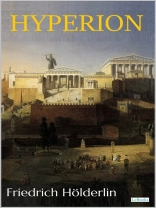Johann Christian Friedrich Hölderlin (1770 — 1843) was a German philosopher, lyric poet, and novelist who managed to synthesize the spirit of ancient Greece in his poetic works. The novel ‘Hyperion, or The Hermit in Greece’ can be considered an autobiography in letters sent by the character Hyperion primarily to his friend Bellarmin and to Diotima. The text is set in ancient Greece, but even 200 years after it was written, the words describing invisible forces, conflicts, beauty, and hope remain relevant. Who has not felt Hyperion's utopian longing for harmony with nature and God, free from alienation? ‘Hyperion’ is part of the collection ‘1001 Books You Must Read Before You Die, ‘ edited by Peter Boxall.
عن المؤلف
Johann Christian Friedrich Hölderlin (1770–1843) studied philosophy and theology as a scholarship student in Tübingen, where he shared a spiritual communion with Hegel and Schelling, who would become philosophers of monumental importance. Like many German writers of the time who wanted to avoid a religious career, Hölderlin embarked on a period of 10 years in unstable jobs, working as a private tutor in wealthy families' homes. By 1806, Hölderlin had descended into complete madness. He was forcibly removed to Tübingen, where he was confined in a tower for 36 years until his death in 1843. During his confinement, he preferred to sign his poems as ‘Scardanelli’ rather than using his own name. His poems written after his internment are considered his greatest works; however, until the 20th century, they were dismissed as insane. It was only in the 20th century that his genius was recognized. Luminaries as diverse as the philosopher Martin Heidegger and the poet John Ashbery cite him as a powerful and disconcerting influence on the history of modern poetry.












